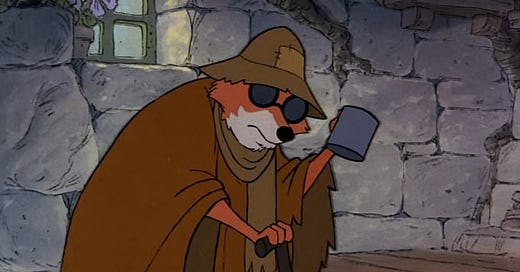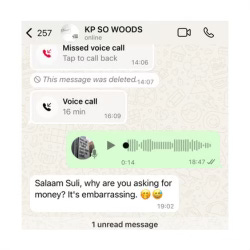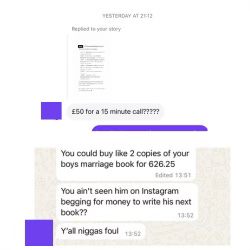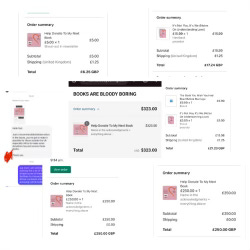People (I mean my people) don’t ask for money. I can count on one hand how many times I have borrowed money from someone outside my immediate family—twice—and only after it was offered. After seeing my dry-lipped, starved face, a close friend handed me sixty pounds. Ten years later, I still feel the shame of accepting it.
Is it pride? Ego? Shame? In my childhood, we called it manners. African respectful rules dictated that we refuse when offered anything—food, money, clothing, gifts (except on special occasions)—from anyone.
It was not uncommon to enter an auntie's house and be offered food, only to receive a stern look from an African mother that said, "Don’t you dare embarrass me." Even as your stomach rumbled and the aroma of sweet meats filled the air, you reluctantly shook your head. No meal could justify facing the death sentence when you got home.
Full disclosure: my parents were pretty cool, but I’ve heard many folktales about children who didn’t live to tell the tale after accepting a piece of candy in an outsider’s house. Maybe it’s a British thing too—it’s seen as polite to refuse.
Our parents taught us not to look desperate. People hate desperate people. So we grew up learning to be self-sufficient.
My plan to be more liberal in this area completely backfired when I let my son accept a Maoam (one of his favourite sweets) from a kind mum at a karate competition. Did this boy not embarrass my entire family lineage by finishing his sweet and then sticking his hand out to ask for another one? Of course, the lady gave him another, but she also made sure to say, "There are only a few left." I almost died of embarrassment. As an adult, "Don’t worry, I got this" became the code we lived by. We never asked for anything—not even help.
Kickstarter and Patreon came to my attention around 2013, before they became staples in creative communities. I liked the idea of people paying to support your ideas, but my upbringing told me otherwise. I remember a friend, a well-respected music manager, telling me directly that he wouldn’t raise money on Kickstarter for his band because it would make them look like they were begging. I know for a fact he wasn’t alone in this thinking. That conversation stayed with me. As people we are trained to look perfect, don’t take risks, sell the dream, sell the perception. There are times where you have to fake it, till you make it, but not at the expense of your progression. Perception and fear and is the killer of many dreams.
Fast forward 12 years, and I’m a different type of creator. I’m no longer insecure about the value I bring. I’ve gained confidence in my ability to deliver. I’ve worked with startups, investors (I invest in companies), and venture capitalists. And I’ve learned that everybody is asking for money for the ideas they believe in.
As I have taken on the challenge of publishing my work in books, I knew I needed to approach it with a different level of vim. I self-published my first book, rejecting the prestige of traditional publishing (you can find out more about the story here). And a few days ago, I took an even bigger step in self-confidence—I publicly asked people for money.
It wasn’t a lot—£1,500—but for my production business. It felt like ‘one small step for the next book, but one giant leap for mankind. I wrote a humble post in my newsletter explaining that I needed to raise £1,500 to break even on my next book production.The campaign was designed to let people pre-order the next book while also receiving special incentives for contributing to the launch. Full disclose, I didn’t have the confidence to start with a bigger amount, I knew I could afford to pay £1500 (with my pride in tact) if all else failed, but it was not just about money, it was breaking the shackles of fear and perception. I created a tier list of ways people could support. Then came the hard part—I hit publish. I posted it on Instagram with a few memes and went about my day.
This is a real message from my mum ( I love you!):
And my boys teased me!
Yet something happened. People started supporting, we crawled closer to the goal, step by step. Strangers, supporters, and even people I’d only exchanged a few conversations with contributed—not because they necessarily wanted a copy of my book, but because they wanted to support my business. Five pound donations, twenty five pound, two hundred and fifty pound.
This is the power of putting yourself out there.
Last week, I wrote a post called "Why You Should Share Your Work (Even If No One Cares)", which sums up my approach to creating without validation. Yet, it’s also a call for creators to have confidence in their ideas.
The tipping point in my campaign came when an organisation I had spoken to in the past, messaged me. They had been wanting to work with me for a while, and we worked out an agreement (I’m actually finishing the proposal to send off next week) that would bring an extra £5,000 to the campaign.
In total, I ended up with close to £8,000— almost 400% (if Chat GPT got the maths right) more than my original target.
Creators—have confidence and build, and they will come. It was one post. A small amount of confidence. And people responded. The campaign is still live if you want to pre-order the book, please go ahead. But more importantly, take whatever confidence you can from my story.
Let me be the guinea pig that inspires you to freedom.
Create, people.
Catch me in London.








